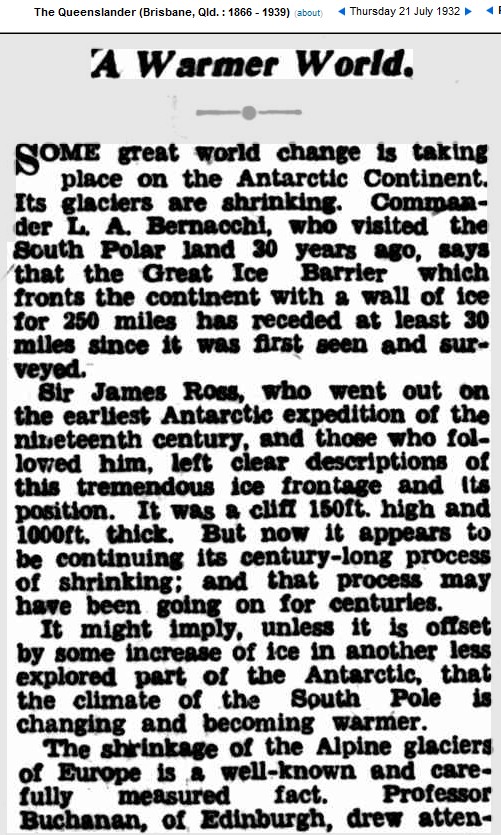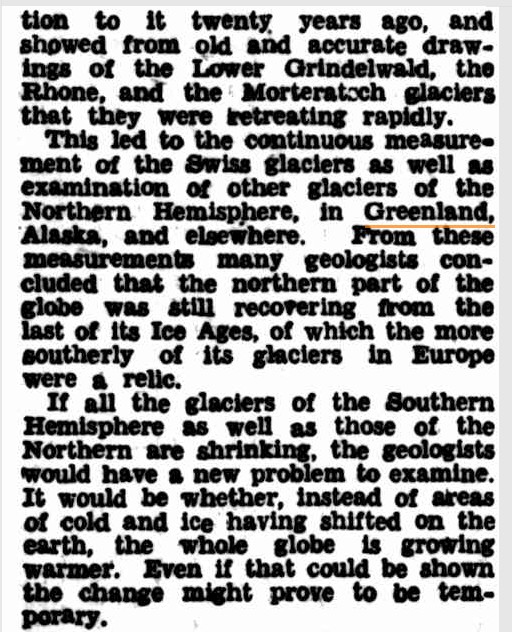Glaciers all over the planet were rapidly losing ice – long before the SUV was invented.
Disrupting the Borg is expensive and time consuming!
Google Search
-
Recent Posts
- Analyzing The Western Water Crisis
- Gaslighting 1924
- “Why Do You Resist?”
- Climate Attribution Model
- Fact Checking NASA
- Fact Checking Grok
- Fact Checking The New York Times
- New Visitech Features
- Ice-Free Arctic By 2014
- Debt-Free US Treasury Forecast
- Analyzing Big City Crime (Part 2)
- Analyzing Big City Crime
- UK Migration Caused By Global Warming
- Climate Attribution In Greece
- “Brown: ’50 days to save world'”
- The Catastrophic Influence of Bovine Methane Emissions on Extraterrestrial Climate Patterns
- Posting On X
- Seventeen Years Of Fun
- The Importance Of Good Tools
- Temperature Shifts At Blue Hill, MA
- CO2²
- Time Of Observation Bias
- Climate Scamming For Profit
- Climate Scamming For Profit
- Back To The Future
Recent Comments
- arn on Analyzing The Western Water Crisis
- conrad ziefle on Analyzing The Western Water Crisis
- Bob G on Analyzing The Western Water Crisis
- conrad ziefle on Analyzing The Western Water Crisis
- Bob G on Analyzing The Western Water Crisis
- Bob G on Analyzing The Western Water Crisis
- Bob G on Analyzing The Western Water Crisis
- arn on Analyzing The Western Water Crisis
- Scott Allen on Analyzing The Western Water Crisis
- conrad ziefle on Analyzing The Western Water Crisis




1930’s.
One mile per annum Ice Receding Rate (IRR) in 1932.
This was obviously recognized as an unmitigated disaster in Europe.
No wonder the pre WW2 Green Party in Germany voted Hitler in to save the world a year later.
In 1840 the explorer James Ross was the first person to do a marine survey of what was later named for him, The Ross Ice Shelf. In 1912, Robert Falcon Scott, the second man to lead an expedition to the geographic south pole, also surveyed The Ross Ice Shelf. Both men were chosen to lead their expeditions because of their navigation and marine survey skills. Falcons entire party perished after reaching the pole ( He refused to use dogs and proved that men couldn’t drag enough food for such a long journey and back ). A later expedition brought back his logs and journals to England. A noted naturalist of the age was quoted as ” lamenting that the Great Ross Ice Shelf has retreated by over 50 miles between surveys 62 years apart. He wished he had seen it it all it’s glory. Ross discovered the ice shelf in a sailboat without a steam engine. Scott’s ship was more technologically advanced, it had auxiliary steam power. Sail was used for distance and coal powered steam for power and maneuverability in the ice. So the largest Antarctic ice shelf was already receding 1 mile a year when first discovered during the Age Of Sail.
I don’t pretend to know what was causing this melting of the ice shelf. Unfortunately, man made global warmist claim to know. They blame it on something that did not exist when it was first noted that the ice shelf was retreating.
At least the journalist had the decency to suggest “the change might prove to be temporary”. Which they won’t do these days. Kills the scare right there.